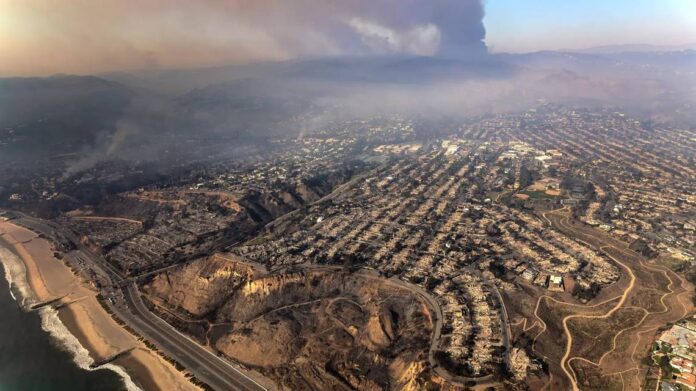
🔥 Flash Points: What You Should Know
- Alleged Insurance Stonewalling:The California FAIR Plan faces serious allegations of bad faith and breach of contract for refusing to release key claims documents to wildfire victims in Pacific Palisades.
- Toxic Home, No Help:Plaintiffs say their soot-drenched, toxin-filled home remains uninhabitable while FAIR Plan withholds damage assessments and delays payouts—leaving them couch-hopping with a young child.
- Statewide Pattern of Delay and Denial:This case follows a growing stack of lawsuits accusing FAIR Plan of systemic misconduct, with legal precedent and insurance statutes pointing to consumers’ rights to access their own claims files.
By Samuel Lopez – USA Herald
[LOS ANGELES, CA] – When wildfires ripped through Los Angeles in January, Pacific Palisades residents Scott and Lissette Jungwirth thought their homeowner’s policy with the California FAIR Plan would be their safety net. Instead, they say they’ve been left homeless, helpless—and fighting in court for basic access to their own claims documents.
Filed in Los Angeles County Superior Court, the lawsuit accuses the California FAIR Plan Assn. of bad faith, breach of contract, and additional misconduct.
The Jungwirths’ also filed a motion for a temporary restraining order and preliminary injunction compelling the FAIR Plan to turn over photographs, adjuster narratives, and communications related to their claim, and that motion has now been granted.
The legal action, brought by law firms Edelson and Kerley Schaffer, accuses FAIR Plan of bad faith insurance practices, breach of contract, and violations of California Insurance Code Section 2071, which mandates insurers provide reasonable documentation to policyholders upon request.
The Jungwirths’ home wasn’t consumed by flames but was penetrated by fire debris, ash, and airborne toxins after a window shattered. Tests by a certified environmental hygienist allegedly detected lead, cyanide, and heavy metals, rendering the home unlivable and requiring full remediation.
“We’ve been staying in hotels, with relatives, and in Airbnbs for months—our daughter has no stability,” the couple said in their filing. “And yet FAIR Plan continues to stonewall us.”
Attorney Dylan Schaffer, who represents the Jungwirths, said FAIR Plan has been actively suppressing adjuster reports that show just how extensive the damage really is.
“A lot of these adjusters are telling California FAIR Plan the truth: These houses are really badly damaged,” he said. “They need all kinds of work. And California FAIR Plan takes those and they slash them.”
The lawsuit specifically references California Insurance Code § 2071(e), as amended following the 1994 Northridge earthquake, which provides that insureds have the right to certain claim-related documents upon written request.
Further bolstering the Jungwirths’ case is a January 6, 2024 ruling in Fresno County Superior Court, where a judge ordered FAIR Plan to produce adjuster documents for a wind-damage claim, setting a persuasive precedent.
This litigation marks just one in a growing pile of lawsuits against FAIR Plan. Another filed May 2 by Luis Cazares, an Altadena homeowner, alleges that FAIR Plan paid him only $55,850—far below what’s needed to repair his fire-damaged home. That case is Cazares v. California FAIR Plan Assn., also in Los Angeles County Superior Court.
The California FAIR Plan was established in 1968 to provide coverage for homeowners unable to obtain insurance in the private market. It was created by a statutory amendment to the California Insurance Code (section 10091 et seq.) in response to insurance companies refusing to cover homes in high-risk areas following a series of brush fires and civil unrest in the 1960s.
But what many policyholders don’t realize is that it’s not a government entity—it’s governed mainly by California’s licensed property insurers, including State Farm General Insurance Co., which share profits, expenses, and losses in proportion to their market share.
This raises deeper questions: Is the FAIR Plan being used as a risk dumping ground for insurers to shield their balance sheets while offering minimal coverage for maximum premiums?
Recent lawsuits accuse insurers of coordinating to push homeowners into FAIR Plan coverage, then refusing to pay out adequate claims once disaster strikes. These allegations are sparking a potential industry reckoning in a state already grappling with escalating wildfire risk, premium hikes, and insurer pullouts.
In California, bad faith insurance conduct is a serious allegation. When an insurer unreasonably withholds policy benefits, it may be liable for punitive damages, attorneys’ fees, and even emotional distress under cases like Egan v. Mutual of Omaha Ins. Co. (1979) 24 Cal.3d 809.
The Jungwirth and Cazares lawsuits may ultimately open the door to class action certification, especially if additional policyholders come forward—something plaintiffs’ attorneys say is imminent.
As California’s insurance crisis deepens—prompted by massive wildfires, increased climate risk, and the exodus of private carriers—policyholders are being funneled into the FAIR Plan at record rates. But with mounting litigation and allegations of systematic bad faith, consumer advocates worry that the plan meant to be a “last resort” may actually be a dead end.
Explore More
🔗 Follow us on X @RealUSAHerald


